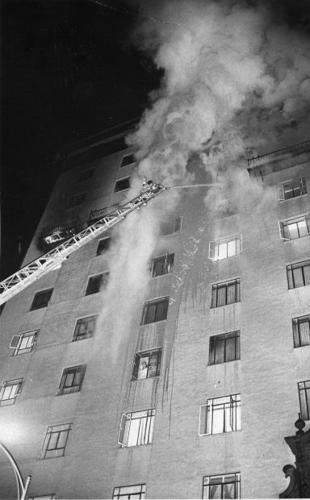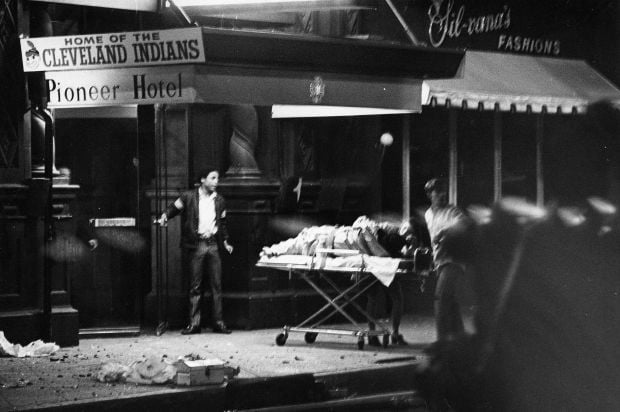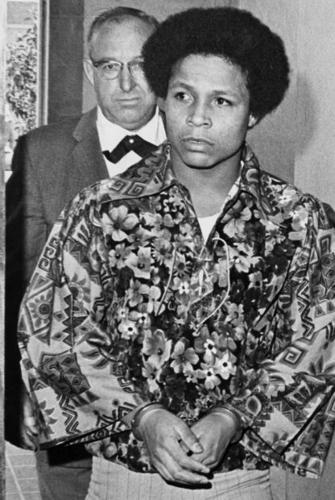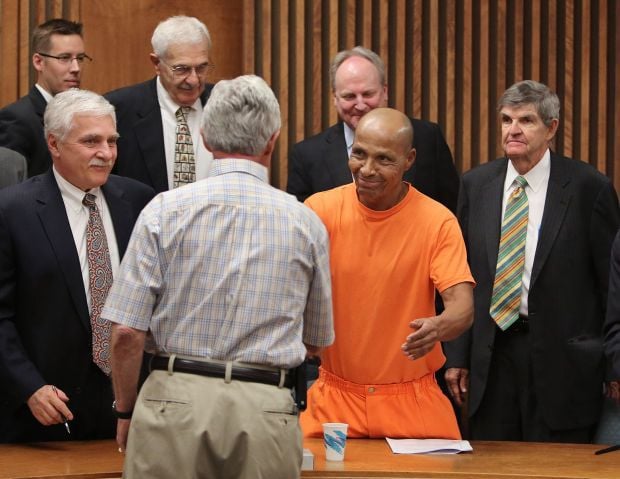The man convicted of starting the Pioneer Hotel fire in downtown that killed 29 people in 1970 has filed a lawsuit against the city of Tucson and Pima County, accusing them of conspiracy and discrimination.
Louis C. Taylor, who was convicted in 1972 and served more than 40 years in prison, accused the two governments of depriving him of his constitutional rights through racial discrimination and refusal to disclose evidence that could have exonerated him at trial.
Taylor, now 60, pleaded no contest in a 2013 plea agreement that set aside his original conviction and allowed for his release from prison. Although never exonerated of the crimes, he has maintained his innocence.
Taylor’s attorney, John Leader, did not return phone calls requesting comment on the case.
City and county officials would not comment on the lawsuit because the case is pending.
Taylor’s trial in 1972 has been viewed by many as flawed at best, and unjust at worst.
The suit claims the prosecutor was overbearing for having objected more than 2,000 times, making it difficult for Taylor’s inexperienced attorney to build a case.
Later reviews of the trial also found that the prosecutor, Horton Weiss, and the trial judge discussed the case privately before the trial, without including Taylor’s attorney.
The suit makes additional claims against Weiss, who died in 1983, alleging he was known for unprofessional and improper courtroom behavior.
At the time of Taylor’s trial, for instance, Weiss faced five contempt of court charges related to a separate case for making inappropriate comments and disregarding a judge’s directives. Weiss later served a 15-day jail sentence in connection with that case.
The suit alleges Weiss and the police intentionally withheld evidence that supported Taylor’s claims of innocence.
It says the prosecutor commissioned a fire investigation report that concluded no accelerant was used to start the blaze, which alone would have cast doubt on the state’s theory of the crime. The report, conducted by Truesdail Laboratories, was never shared with the defense.
Instead, the prosecution relied on the research and testimony of Tucson Fire Department investigator Cy Holmes, whose work on the case Taylor’s defenders claim was flawed and would never meet modern standards.
Holmes testified at trial that he believed the fire was set intentionally, even speculating the culprit was a black teenager. He remained steadfast in his original analysis even decades later in a 2012 deposition.
“Blacks at that point, their background was to use fire for beneficial purposes,” Holmes said in the deposition.
In addition to Holmes’ investigation, the prosecution relied upon a witness named Robert Jackson who claimed Taylor confided to him while in jail that he used lighter fluid to start the fire.
Taylor’s attorney wrote Jackson’s testimony directly contradicts evidence prosecutors had in the Truesdail report.
“With actual or constructive knowledge that Jackson’s testimony was false, and knowing that Jackson’s testimony was contradicted by the undisclosed ‘Truesdail’ report, the defendants nonetheless caused or allowed Jackson to testify,” the lawsuit claims.
The complaint also said police arrested and interrogated Taylor for more than 8 hours on the night of the fire in violation of his constitutional rights.
Although Taylor was 16 years old at the time, police questioned him without an attorney or an adult guardian present. Taylor also submitted to and passed a polygraph examination the night of the fire.
The lawsuit goes on to question how police almost immediately accused Taylor in the Pioneer fire, even when a different person was a suspect in three previous potentially arson fires at the hotel.
In short, the suit claims: “Taylor was railroaded.”
Taylor’s complaint makes seven charges under federal law citing deprivation of rights. It accuses both the city and county of having policies permitting racial discrimination at the time of Taylor’s trial, failing to train police and other employees, prosecutorial misconduct and conspiracy to violate Taylor’s constitutional rights.
Taylor is seeking undisclosed compensatory and punitive damages.
Because the suit accuses the city and county of violating federal civil law there was no need to file a notice of intent to sue, as would normally be required when seeking damages against a government entity.
Since his release from prison, Taylor has alternated between living in hotels and temporary housing and being homeless.
Friends and supporters have helped pay his expenses, and in November established a gofundme.com site to raise money for him. To date the site has raised $1,835.
Leader told the Star in November he would like to arrange for Taylor to meet with a career counselor and receive job training.









